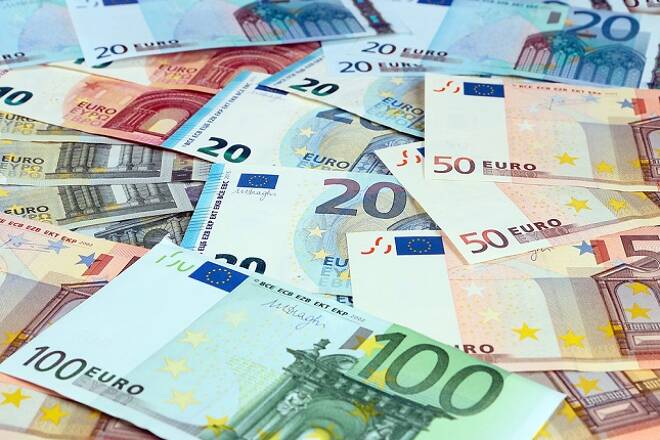Advertisement
Advertisement
The EUR/USD Edges Higher as Momentum Turns Positive
By:
The EUR/USD consolidated edging higher, ahead of the ECB meeting, which could provide hints toward the end of QE. Growth is slow but the recent uptick in
The EUR/USD consolidated edging higher, ahead of the ECB meeting, which could provide hints toward the end of QE. Growth is slow but the recent uptick in inflation will provide ECB members with the cover they need to reduce liquidity and eventually increase rate. The EU PM came out in line with expectations while EU retail sales edged higher.
Technicals
The EUR/USD edge higher hovering above support which was former resistance near the 10-day moving average at 1.166. Resistance is seen near the 50-day moving average at 1.2029. Momentum has turned positive as the MACD (moving average convergence divergence) line generated a crossover buy signal. This occurs as the MACD line (the 12-day moving average minus the 26-day moving average) crosses above the MACD signal line (the 9-day moving average of the MACD line).
Eurozone composite PMI confirmed
Eurozone composite PMI confirmed at 54.1, unchanged from the preliminary number and down from 55.1 in the previous month. The final services reading was revised marginally lower to 53.8 from 53.9 reported initially and down from 54.7 in April. So a broad decline in confidence levels in April, with the composite output index at the lowest level since November 2016. Still, these are still high levels and the composite index has now signaled expansion for 59 straight months. Job creation continued to expand for the 43rd successive month and while it is at a 17 month low that is also reflecting emerging shortages of skilled labor in countries such as Germany, where the labor market is already tight.
Meanwhile Spain, where the jobless number remains high, reported an acceleration in the pace of job creation. Still, Markit reported that the “combination of slower growth of output, new orders, backlogs and employment suggest that the outlook for the euro area economy is less bright than in quarter one”.
Eurozone retail sales rose
Eurozone retail sales rose just 0.1% month over month in April, less than anticipated, but with March revised up to 0.4% month over month from 0.1% month over month, the annual rate still stood came in at 1.7% year over year, up from 1.5% year over year in the previous month and the three months trend rate came in at 0.0%, up from -0.1% in march and -0.2% in the three months to February. So somewhat of an improving trend, even if the reading remains weak. PMI surveys suggest ongoing job creation and there are signs that wage growth is slowly picking up, so consumption should continue to underpin overall growth.
Italy’s Conte calls for fairer Europe with more solidarity
Italy’s Conte calls for fairer Europe with more solidarity. Italy’s new government will focus on social measures and will pass a universal income tool, is seeking a fairer tax system and plans to narrow the economic growth gap with the gap of the EU. So far so predictable in Premier Conte’s maiden speech to parliament, and while Conte also said the government wants to reduce debt, he also said that Italy’s debt is predictable and called for a fairer Europe with more solidarity, which suggests fresh calls for more burden and risk sharing down the line. Italian bonds were under pressure going into Conte’s speech and spiked to a high of 2.6505% at the start of his comments before falling back slightly to now 2.627%, still up 12.8 bp on the day.
The UK May services PMI smashed expectations
The UK May services PMI smashed expectations, rising to a best in three-months headline reading of 54.0 from the 52.8 outcome that was seen in the April survey. The median forecast had been for a decline to 52.1. As with both the May manufacturing and construction PMI surveys, which also beat expectations at the headline level, the details of the report reveal caveats. New business volumes remain subdued, with Brexit-related uncertainty getting a specific mention from respondents, blaming it for holding back decision making among clients. At the same time, tight labour market conditions placed upward pressure on staff wages while associated difficulties in recruiting led to the second weakest increase in employment in the sector since March 2017. Business confidence moderated for a third time out of the last four months.
About the Author
David Beckerauthor
David Becker focuses his attention on various consulting and portfolio management activities at Fortuity LLC, where he currently provides oversight for a multimillion-dollar portfolio consisting of commodities, debt, equities, real estate, and more.
Advertisement
